Business consulting is a growing field and a rewarding one as well. Effective Business Consulting is challenging, sure, but every client presents an opportunity to learn and grow as you add to and refine your skills. Clients don’t come easy, however. From networking and marketing to finding tools and resources software, the tips in this article can help you build your professional network, win new clients, and become a successful business consultant.
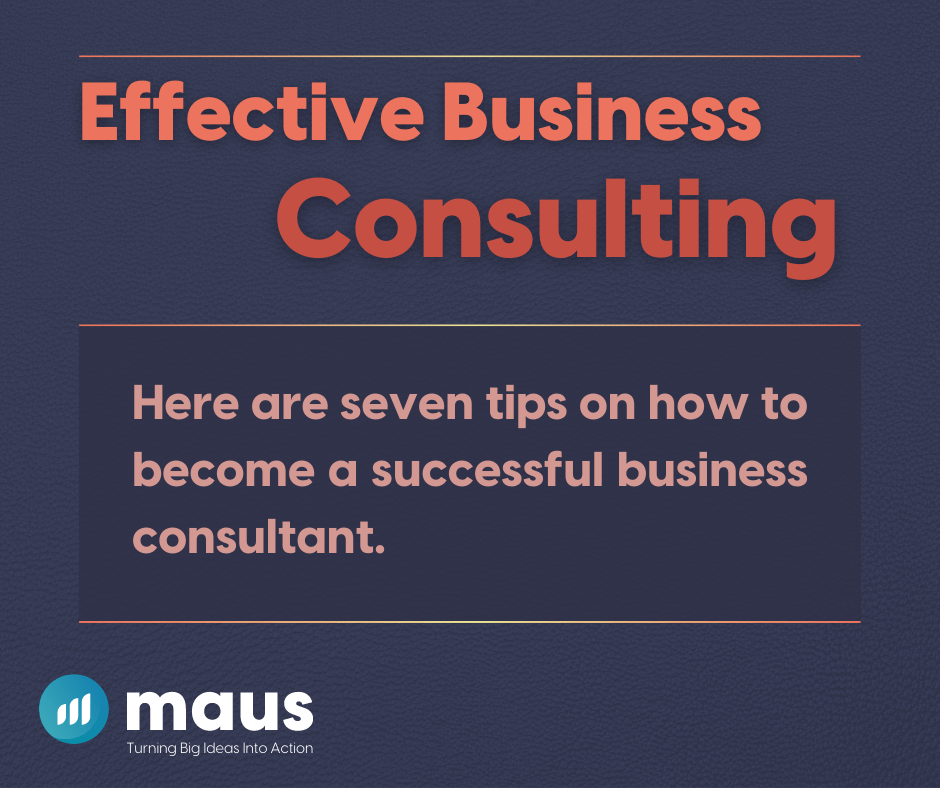
1. Establish Your Business Advisory Niche
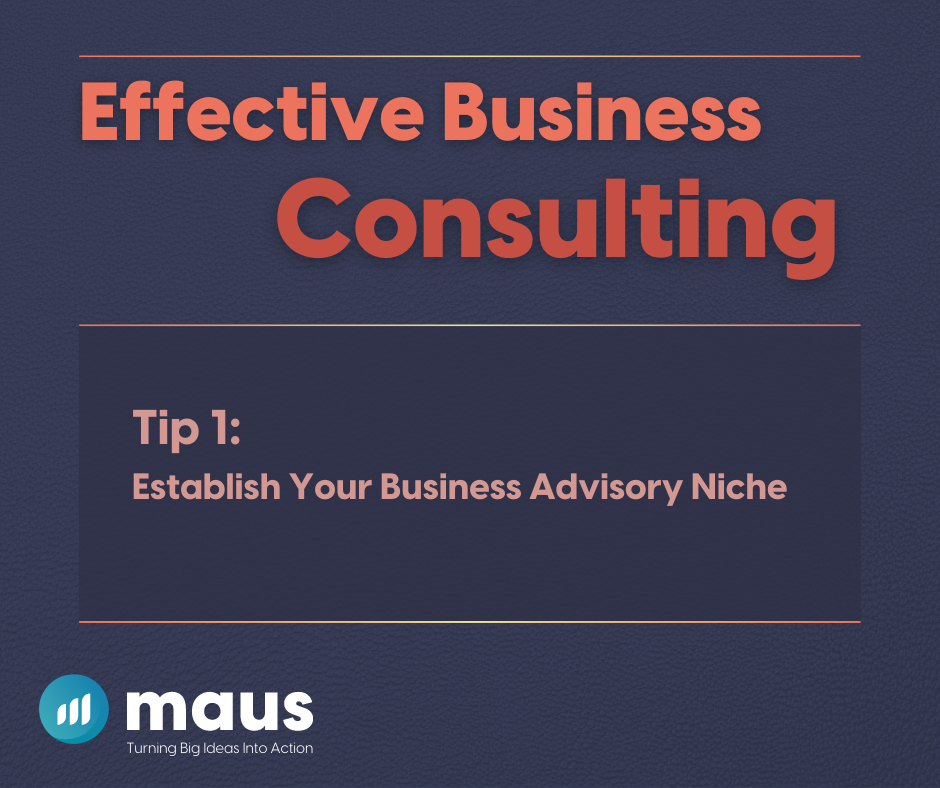
In theory, offering the widest range of services nets the greatest number of clients. However, in practice, that is rarely the case. Casting a wide net works in some industries, but for business consulting, it’s far better to highlight specific skills in your efforts to win new clients. That means finding a niche and emphasizing your unique selling proposition.
With that established, it becomes easier to showcase skills and gain credibility. To determine your niche, you’ll need to assess your skills and determine where you can offer the most value.
For instance, if you have project management experience, focus your consulting work on that niche. If you’re skilled in financial consulting, target companies needing financial help.
Establishing a niche will help you focus your efforts and create a successful consulting business.
Moreover, focusing on a particular niche can help you establish yourself as an expert in that area. This means that businesses looking for help in your area of expertise are more likely to turn to you for guidance. For example, if you’re known as one of the top human resources consultants, companies seeking advice on HR-related matters will come to you.
You can differentiate yourself from the competition by targeting a specific area of the consulting industry. This can be especially important when it comes to winning new clients, as you’ll be able to demonstrate a unique skill set that sets you apart from other consultants.
Additionally, by focusing on a niche, you can conduct more competitive analysis, identify gaps in the market, and fine-tune your consulting firm’s offering to serve your clients better.
2. Create a Real-Life Professional Network
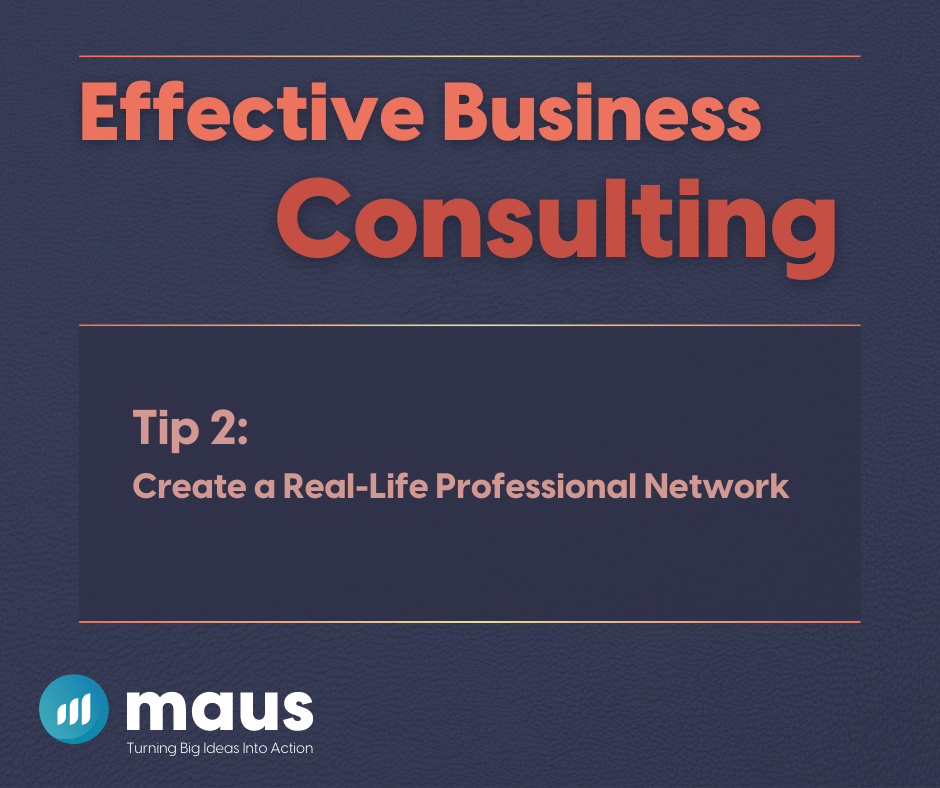
As great as social media is for connecting with people virtually, it isn’t the same as face-to-face interactions. In this case, real-world strategies for networking are of great value. That includes attending conferences and trade shows and attending professional association events.
Once you’ve defined your ideal client, target the events they’re likely to attend. This could include speaking engagements or local commerce and industry meetings. Online networking is great too, but getting out from behind the computer screen is a time-tested way to win new clients.
Attending conferences and trade shows allows you to meet potential clients and build relationships with other professionals in your industry. These events provide a platform for you to showcase your expertise and establish yourself as a trusted advisor.
By actively participating in professional association events, you can engage with like-minded individuals who can refer you to their network.
When attending these events, make sure to come prepared with business cards and promotional materials that clearly communicate your consulting services. Be confident in networking and talk with individuals who could benefit from your expertise.
Don’t be afraid to ask questions and actively listen to the challenges they are facing in their business.
Additionally, consider speaking engagements as an effective way to establish yourself as an authority in your field. Look for opportunities to share your knowledge and insights at industry events or local business organizations.
This positions you as an expert and allows you to connect with potential clients actively seeking business consulting services.
While online networking is valuable, building real-life connections adds a personal touch to your consulting approach. By attending events and engaging in face-to-face interactions, you can establish trust and rapport, which is essential for winning new clients. So, don’t underestimate the power of networking in the physical world, as it can significantly contribute to your success as a business consultant.
3. Ask for Referrals to Win New Clients
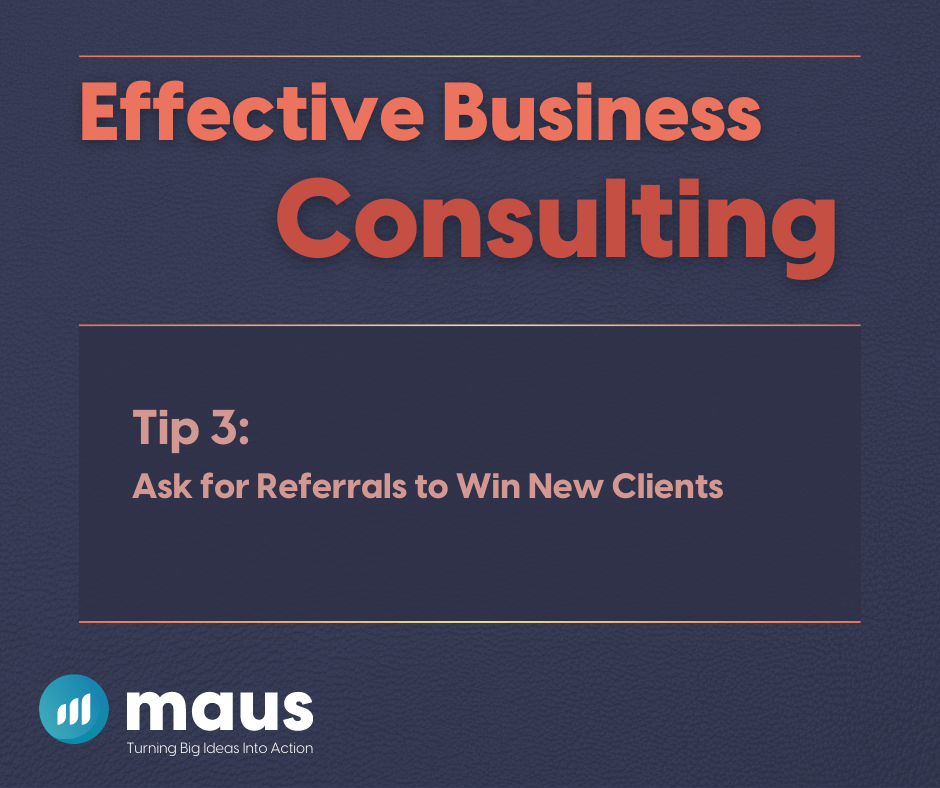
Once you’ve grown your list of happy clients, win new clients through referrals. It’s as simple as asking a current or past client to recommend your business consulting services to others. Increase referral rates by offering incentives for referrals.
Offering small commissions or upgraded business advisory services for referrals will get those recommendations coming in much faster. Make sure you’re also maintaining strong relationships with your existing clients. This way, they’ll be more likely to think of you when someone they know needs business consulting services.
Always follow up with your clients and ensure they’re satisfied with your work. Happy clients are more likely to refer you to others.
When asking for referrals, it’s important to be specific about what kind of clients you’re looking for. This will help your current clients understand who to refer to you.
For example, if you specialize in working with small businesses, let your clients know you want to work with more small business owners.
You can even create a referral program that rewards clients who refer others to your business.
Overall, referrals are a great way to grow your business consulting practice. Maintaining strong relationships with your current clients and asking for referrals can quickly and effectively bring in new clients.
So, don’t be afraid to ask for referrals – you might be surprised at how willing your satisfied clients are to recommend you to others.
4. Blog on Business Advisory Topics
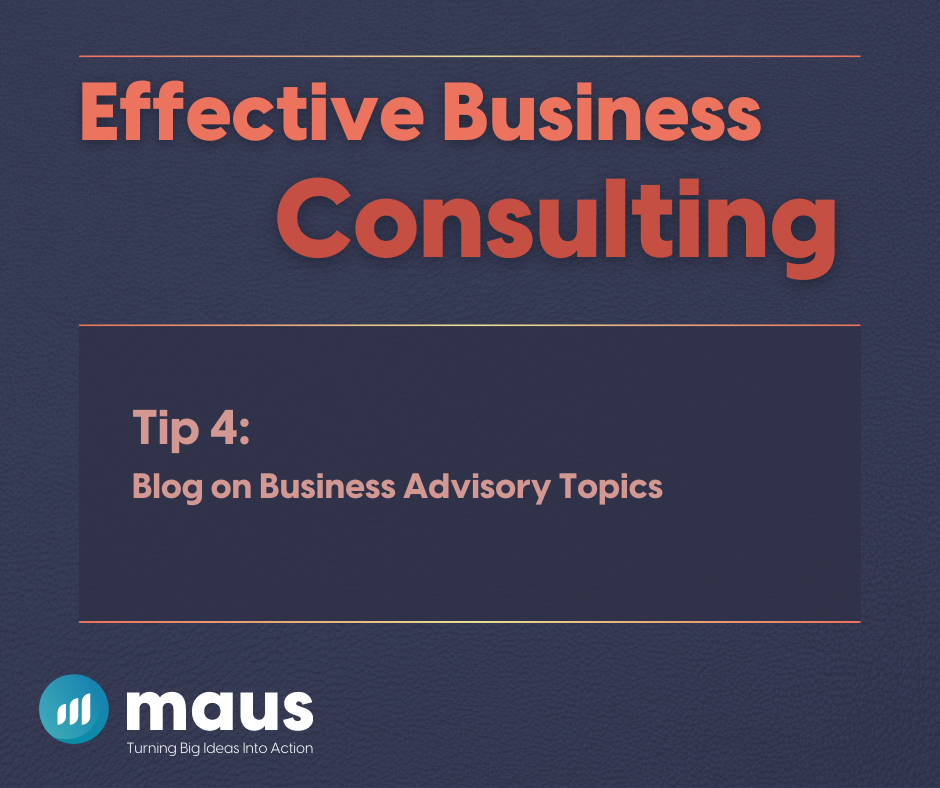
Once you’ve established your niche and identified your ideal client, you’ll have a better idea of what their needs are. You’ll also know what problems they face. After that, the next step is to become a problem solver. That means setting yourself up as an authority in business consulting. Blogging is a great way to do this. You don’t even need a website; you can create a professional blog on LinkedIn.
You can also offer to contribute an article to an established blog or start one of your own. Write about your experiences or a specific problem you solved for a client.
Explain a new business trend or create a how-to guide. Once you’ve published a post on a business advisory topic, promote it on your social media accounts to win new clients.
Another benefit of blogging is that it helps you stay current on business trends and strategies. By researching and writing about these topics, you can provide even better advice to your clients.
Ensure your posts are well-written and informative, with a clear call to action that invites readers to contact you for more information.
Lastly, consistency is key when it comes to blogging. Set a regular schedule for posting and stick to it. This will help keep your blog fresh and relevant and ensure that your clients see you as a reliable source of information.
5. Use Social Media and Targeted Advertising
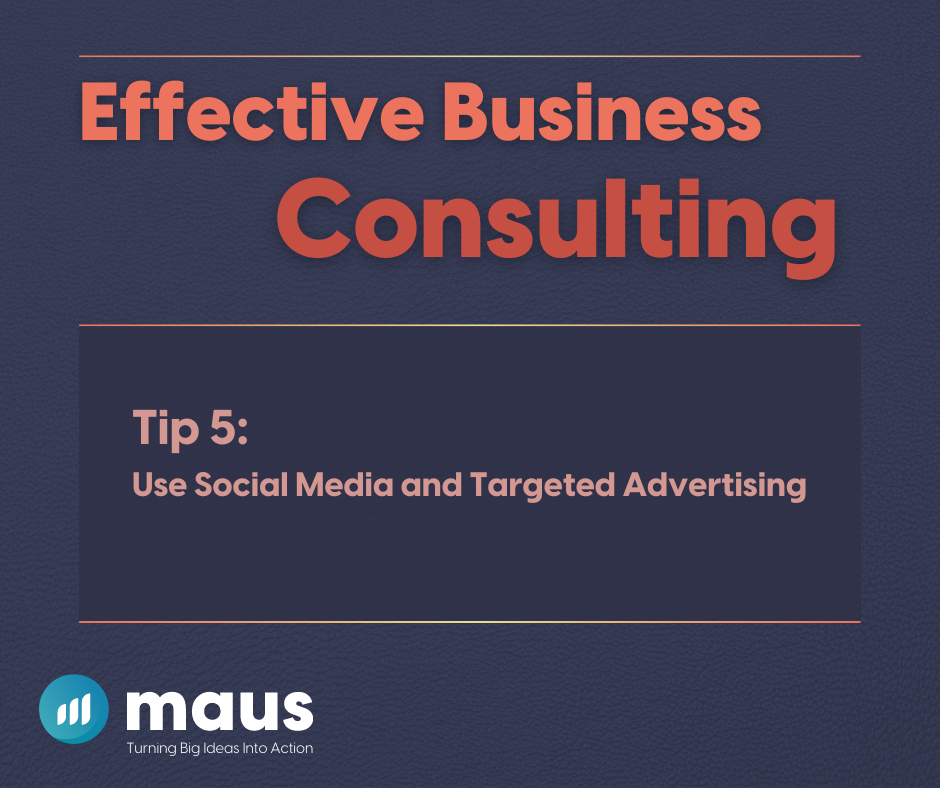
Social media is a great tool for pointing potential clients to your website or a blog post you’ve written. Of course, social media takes time. The most active users are the most successful. To give yourself an edge, consider paid advertising to win new clients.
For example, Facebook ads target users with specific interests. Google ads offer advantages in targeting specific demographics as well. Don’t forget the free stuff too! Optimizing your profile on LinkedIn is an easy way to increase appeal to potential clients.
Use your account to join industry groups, then stay in the conversation about business advisory topics. While social media is a great way to get your message out, it is important to target the right audience.
Take the time to define your ideal client and tailor your advertising approach to reach them. Ensure your message is clear and concise and highlights the value you bring to the table.
Another effective strategy is to partner with other businesses that share your target audience. You can do this by offering referral incentives, guest blogging on their websites, or sponsoring events they host.
This will help you build your network of contacts and establish yourself as a trusted advisor in your niche.
6. Become an Accredited Partner
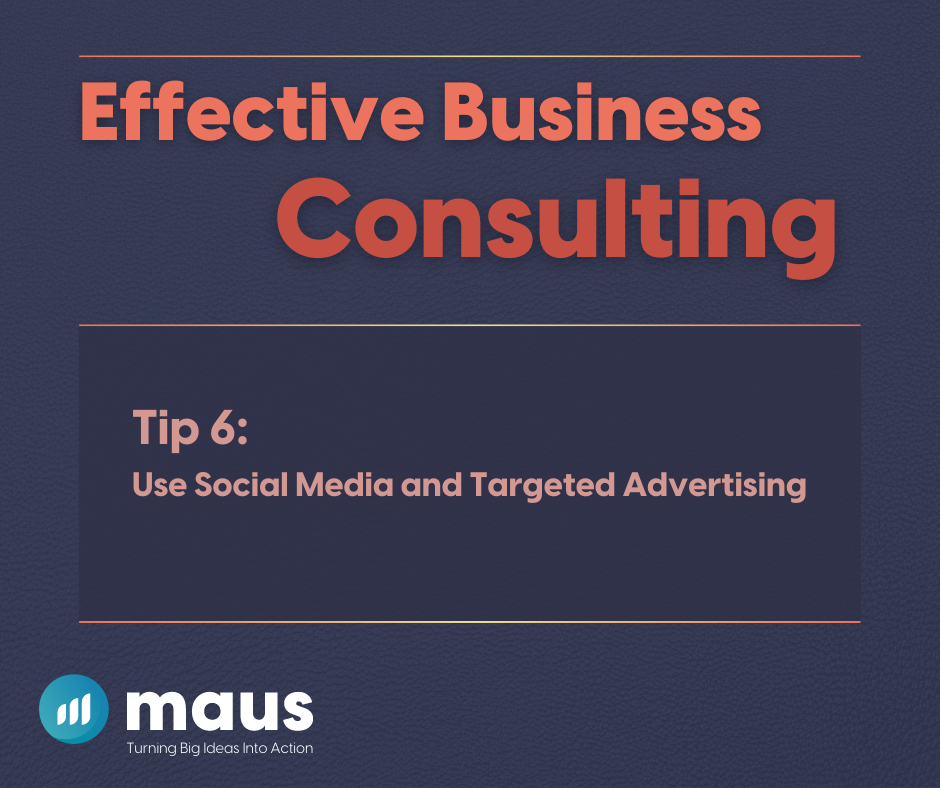
Becoming a Maus Accredited Partner is a way to fast-track your practice and go-to-market with a structured, systemized approach. Maus’s Partner Program provides value beyond exit planning and consulting tool within the Maus platform.
It includes a business advisory certification as well as ongoing mentoring and support. It also grants access to a suite of marketing tools and lead-generation resources to save you from reinventing the wheel and allowing you to get your message out there quickly!
As a Maus Accredited Partner, you are also a member of their network of expert business advisors, consultants & coaches.
In short, it’s a way to cover all of the steps mentioned without going down the pathway alone while also providing the freedom and flexibility of how you want to operate. Partnering with a reputable business consulting organization can bring your practice to a whole new level.
Through the program, you’ll receive ongoing training and support from experienced mentors and consultants. You’ll also have access to an exclusive online community of fellow partners who share your passion for helping businesses grow and thrive.
Moreover, becoming a Maus Accredited Partner offers a level of credibility and recognition that can help you win new clients and build trust with your existing ones. You can leverage the Maus brand, proven methodologies, and marketing materials to position yourself as an expert in business advisory and differentiate yourself from the competition.
Lastly, the Maus Partner Program offers the flexibility and autonomy to run your consulting practice your way, while still benefiting from a structured and proven approach. You’ll have the freedom to choose the services you offer, set your pricing, and target the clients you want to work with. At the same time, you’ll have the support and resources you need to streamline your processes, increase your efficiency, and maximize your revenue.
7) Continuously Improve and Adapt the Consulting Approach
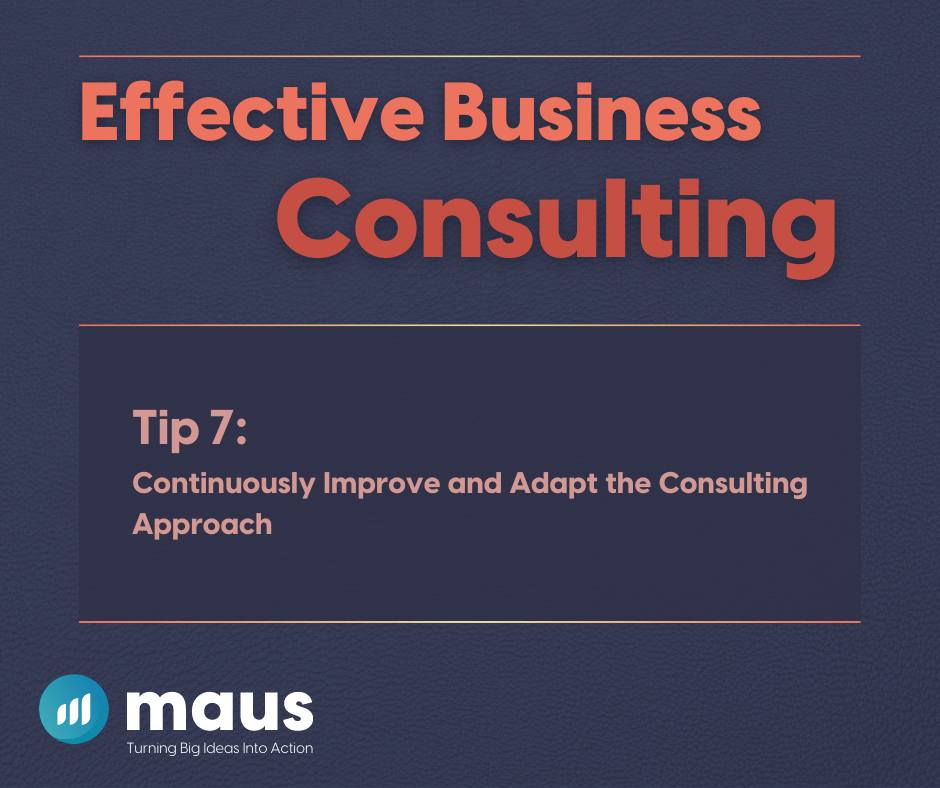
To become a successful business consultant, improving and adapting your consulting approach continuously is important. The business world is constantly evolving, and as a consultant, it’s crucial to stay ahead of the curve.
One way to do this is by investing in your professional development. Attend conferences, workshops, and seminars to learn about your field’s latest trends and best practices. Stay up to date with industry publications, research, and case studies. This will allow you to provide your clients with the most relevant and effective solutions to their business challenges.
Another way to continuously improve is by seeking feedback from your clients. Regularly ask for their input on your consulting services and be open to constructive criticism. Use their feedback to identify areas where you can improve and make necessary adjustments to your approach.
Additionally, be adaptable and flexible in your consulting methods. Different clients have different needs and preferences, so it’s important to tailor your approach to meet their specific requirements. Be willing to try new strategies and techniques to achieve the desired outcomes for your clients.
Finally, watch emerging trends and technologies that can enhance your consulting services. Embrace new tools, software, and methodologies that can streamline your processes and deliver better results.
By continuously improving and adapting your consulting approach, you will provide value to your clients and position yourself as a trusted and sought-after business consultant.



